#autistic allegory posting
Explore tagged Tumblr posts
Text

#Spock of Vulcan#star trek#autistic allegory posting#spock#Spirk#star trek the original series#St tos#Kirk#jim kirk#james kirk#commander spock#Kiss already#spirk tos#tos
1K notes
·
View notes
Text
psykers are a brilliant unintentional allegory for neurodivergent people. widely believed to be freaks that should be bullied into submission and socially sacrificed to oil the great big inhumane war machine; UNLESS our highly specialised skillset and oddball traits prove useful to that very system — if we can control ourselves, if we can pass standardised testing after suffering gruelling ordeals and abuse from all sides; if we can be just weird wyrd enough that our ~special talents~ show, but not so weird that we’re unable to adapt, the system will forgive us for our curse. still keeping us at a distance and making sure we don’t take a step out of line. we can make a living that way, as sanctioned pariahs tolerated only for their niche (dis)abilities. for a while. until it drives us crazy
oh and unmedicated adhd does sometimes feel like a portal to a hell dimension is always clawing at the back of your skull but that’s irrelevant
#posts that could be about the x men but i don’t care about xmen right now. that’s more of a queer allegory anyway so#remember: wizards. are. audhd. doubly so if the wizards in the setting are oppressed#in various films novels and shows; female autism is practically synonymous with telekinesis. carrie; matilda; eleven from st; ianowt; etc#point is. you show me a universe where a subset of people are treated as highly suspicious and undesirable apart from one trait that#redeems them through ‘usefulness’; and i’ll show you a neurodivergence metaphor. specifically autism & adhd#ivy.txt#warhammer 40k#warhammer 40000#psykers#autism#audhd#actually autistic
21 notes
·
View notes
Text
bestowing the highest honor i can give to fictional characters on han yoohyun, the quadruple a battery headcanon pack (autistic aroace agender)
#han yoohyun#s classes that i raised#channeling hyj: he’s so lovable. i’m pinching his cheeks. he can commit as much murder and arson as he wants.#text post#k rambles#not sure i can even call it headcanon when i will argue that half of this is just canonical subtext/the consequences of who he is#(mild spoilers in tag) autistic/aroace coded nonhuman entities they could never make me hate you#he’s literally a character made for me��#caveat that having nonhumans as allegories for aroaceness or neurodivergency isnt necessarily a good thing#but they are my thing and i love them
23 notes
·
View notes
Text
(1/2) Karim backstory. Idk when I'll continue writing this summary but this is all pre-Fort Joy and a bit post
First things first: noble family, elven mother & human father, both VERY notable Source sorcerers. Mom left the veneration of the Elder Trees (unfortunately elves in the setting are Like That) to join human society in the form of Investigation and Development of the Arcane (for war. It was for war), which in a kingdom that's at war every two plot beats against Multidimensional Threats, turns out to be a very profitable endeavor. They're new money, but as long as they can keep working with the Order for a couple more generations, it will secure their lineage a very comfortable spot.
Sorcery is not fully inherited, but it is fairly common as long as it's nurtured properly, and everything works out for the firstborn and secondborn (Karin's older brothers). Sister turns out fine, she's not a natural like the first one or can learn her way into getting magic like the second one, but it hits right before being a pre-teen. She's just a bit more artsy about her magic, whatever. The two elders got engaged extremely quickly to strengthen political bonds between houses, she can get to be the "artistic, creative soul" as long as you quit that shit after a few years and get a political marriage soon. Chop chop!
Then Karim comes into the picture. The youngest. Doesn't show any signs of sorcery early on, but that's okay, he can learn how to- oh you are not good at studying? And unable to perform basic spells? Well, I'm sure it will awaken soon. You MUST be doing something wrong. Everyone is Getting It very early on, so there must be something wrong with you, in particular. Why are you like that? Are you doing it wrong on purpose?
Early teenage years hit and he's still Source-less. He has never been treated badly, but there is this non-spoken known secret around him that he's not an equal. To make up for this shame, he needs to be Perfect in everything else (behavior, manners, studies) because it's BAD enough that your mom has to make excuses for you about why you haven't Awoken yet, he cannot make it worse. No one forces him to do this, but it gives him a slight hint of hope, of control. If he works hard enough, sacrifices enough, he will get there.
He doesn't.
He's the youngest, he cannot be married off yet, so his family's best option for him is to join the military and get status that way. He doesn't join as a private, of course, but as a paladin squire to start working upwards. Of course he's a sorcerer, but his call is for the Divine Order and to become a knight. So his family gets both an excuse for his Source-less behavior AND get the unmarriable kid sent away. Win-win.
Military life WAS an improvement tho. There was something soothing about knowing exactly what to do, how to do it, who was in command and what was being asked of you. At this point Karim is already a master of "i cannot be left alone with my thoughts I need to Always Do Stuff", and there was always something to be done. Mantras to be repeated while on watch so he wouldn't have to take a single look inside himself.
He was to be treated as this almost saint-like figure, a Sorcerer, of course, but someone who refused to use his powers for the sanctity of Knighthood. He was never a particularly bellicose person, and he tried to shape his paladin persona into more of a War Medic role, whose healing powers helped the real, actual medicine he knew.
This was his place, or the closest thing he had ever felt to belonging somewhere. He was loved (for something he didn't do), and respected (for a persona that he wasn't) but his near-null introspective meant that this was enough for him.
Be content, and be grateful. Be admired, but never understood. And above all, be useful.
When the Magister reform hit and all non-humans were removed from their positions at the Order, he was spared because his family pulled some strings and "well he's just HALF elf. He doesn't look Like That©. And he has a beard!" but it doesn't mean that the new racist policies didn't hit him hard. The only reasonable option in his mind was to work harder, to prove he deserved his spot to people who wanted to see him gone. It's okay, if only he's a good enough boy he will be fine!!!!
THEN the order to render all magic illegal and send sorcerers to Fort Joy is sent. His family is in grave danger, but like it happens inside the game, a lot of bad situations can be made easier with money. They bribe their way into hiding, but letting them ALL go would be obvious, plus the Magisters need reassurance that they won't turn on them once they're safely out of the city. And so, without his knowledge or consent, Karim gets used as a bargain chip.
The only thing he gets told is that he is to be sent to the Fort as a prisoner to keep his family safe, so they don't have to go. He will be fine, he isn't a sorcerer after all, it's just bureaucracy. He just needs to go through whatever cure they're administering and then come back, good as new!
He, of course, goes with it. Even when he discovers that that place WILL be his grave and he got sent there to die, he still wanted to stay. To be martyrd and to finally deserve love, even in death. He helped the party escape and they, in return, pretty much forced him to go with them (so this dumbass didnt DIE)
He still has a long way to go. He's now an actual sorcerer and Godwoken, so more outside pressure on him to perform his role, yippeee... But having a group of people who genuinely like him for himself and don't want anything in return is helping
#TUMBLR STOP POSTING MY DRAFTS AUTOMATICALLY CHALLENGE#if you ask “is he a transgender or an autistic allegory” the answer is yes. very heavyly handled#i need to write also about a psychosexual analysis i did of him and how he's a cis guy who goes through the same arc about his gender as a#-as a trans man. deciding that he wants to be a man despite his role assigned to him by society#oc: karim#text#original character#oc#she origin on my divinity till i
4 notes
·
View notes
Text
having ocs and posting them on the internet is so embarrassing bc whenever i rewrite an oc or retcon something im just like oh fuck. you arent sneaky stinky. everyone saw that. its the same feeling i get whenever someone sees me trip its like i just rolled a 0 on dexterity
#KLAUS especially oh my god?#thank god i didnt post many klaus scenes before i completely rewrote his character bc WOW#he was really about to be wolfgang 2.0... but with way less to do#first interpretation of klaus was like... spoiled rich kid pull yourself up by the bootstraps 'my parents worked hard for our wealth'#and a sprinkle of misogyny. so kinda like wolfgang but WAY less interesting bc at least wg has trauma and insecurities... ur just rich klau#and then i watched mob psycho 100 and i was like wait a minute. klaus isnt a spoiled hyperindividualist rich kid. hes autistic#not to say u cant be those things and autistic but like.... hes shigeo kageyama adjacent thats all im trying to say ok#and mob psycho 100's story is like pretty obviously an autism allegory at least imo. so yes. klaus is mob psycho adjacent
11 notes
·
View notes
Text

#Data#data soong#data star trek#star trek#st tng#star trek the next generation#Autistic allegory posting#picture of a star trek character with a caption from somewhere else on the internet
338 notes
·
View notes
Text
🧛
#i wanna preface this by just saying im doing alright i was just thinking about sims4 this isnt about specific life events or my current mood#BUT yk how in sims 4 ur vampire sim can have the trait where they randomly hiss in public places#and that constantly lowers their relationship meter with everyone they meet no matter how much u try and build it up#and its like SO frustrating cause either u spend all ur time and energy on constantly fighting this rebuff or everyone just hates u#anyway. this is an allegory for trying to socialize when autistic or something#like i said im feeling alright i just saw a tiktok of a vampire sim and went like damn. me too buddy#my post#also isnt that nonbinary vampire emoji so cute i love the hair sm
1 note
·
View note
Text
Every once in awhile I’m writing straight vampire romance and I actually wanna die bc I am Mormon right??? There is a constant fear at the back of my mind that I am no better than Smeyer and I’m just reinventing Twilight. Except I am not a coward and I am not afraid of erotic blood drinking or for my guys to do premarital sex
#me? no#I’m not really a sex do-er in general#but my brain vampires??? yes#the can do whatever they want they’re literally creatures of the night!!!!#especially bc when I write about vampires (straight or not) I am exploring what it is like to be othered by society#when I write lesbians obviously#being a vampire can be an allegory for being gay#but it also can be for autism#neurodivergence#and religious trauma#and my straight vampires are still othered despite not being openly queer#not JUST because they are vampires#yk?#so if they are doing a sex despite it being against my literal religion#there is a reason for that#because I often feel othered by my own religion for lots of things#whether it be that I’m attracted to women or that I’m ace or autistic or WHATEVER#my characters are escaping that otherness by being with each other- romantic or not. straight or gay or not. they are gonna be WEIRD#Anyways what was this post about
1 note
·
View note
Text
So as I have been making my rounds posting about my book across all social media, some people take a look at my cover, get confused, and ask me at point blank, "Wait. Does this book support trans people or not?"
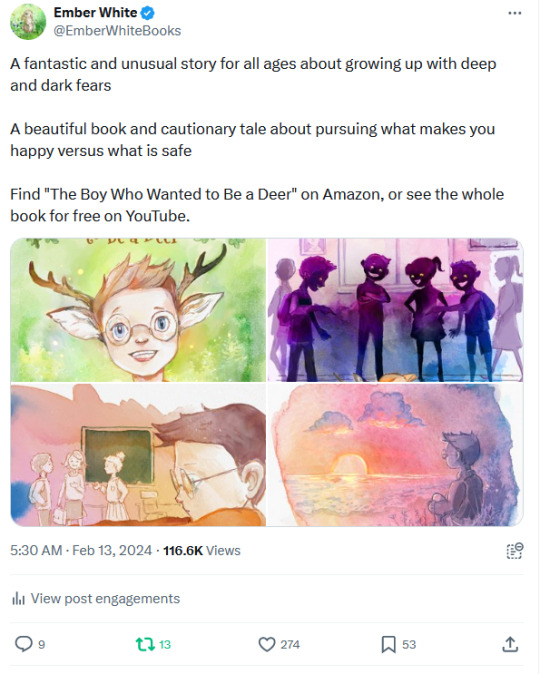

Of course I support trans people (that's the whole point of the book!), but I don't want to use any language that could be interpreted as political by your average Joe that is turned off by any politics. You lose reach that way. I think the book could have a larger impact by using language to make the story more universal to all people. With the right message, it could be seen an an allegory that applies to not only trans people but anyone who feels like they don't fit in with the tribe.


Yes, I did decide to go with the animal metaphor for the book in spite of some hot social issues going on right now. There were previously two books that used that metaphor to make a crude political point. I don't care too much for that, but if you read them, you're ultimately left with the feeling that they discourage children from play and imagination. I used to teach kindergarten and elementary students, so I felt there was something deeply upsetting about that. It was shortly after that I felt I HAD to make this book, no matter what. I saw the stigma around the analogy as a challenge.
The good news is that after talking with other trans people about it the overwhelming majority seem to like the end result. And since the book's launch, I've had so many furries, therians, and autistic people thank me for making the book. There's something about the experience of what it is like to utterly deny things that are inevitably part of the self yet completely oppose the tribe and the regrets we ultimately face because of it. A lot of people can relate to that. It is the heart of the struggle of all humanity and society. That is culture, not politics.
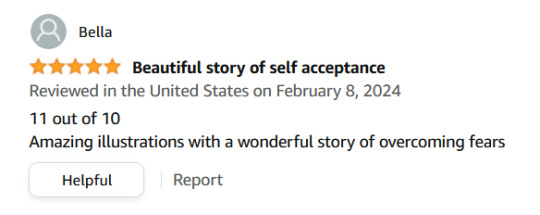
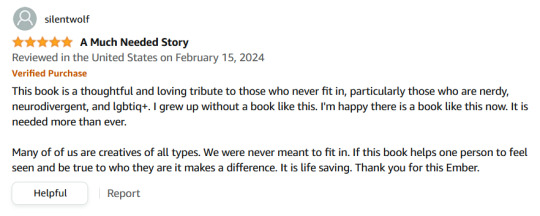
So there you have it. "The Boy Who Wanted to Be a Deer" is now available on Amazon, or you can read the whole thing for free on YouTube.
If you would like to support the book, ratings on Amazon and Goodreads are the best way to do so.

2K notes
·
View notes
Text
i saw a post (that must be from a WHILE back) calling connor autistic and i just haven’t been able to stop thinking about it
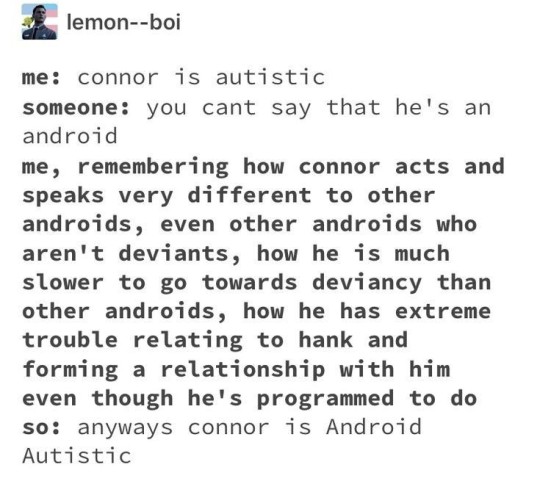
in addition to what they’ve said, i also want to point out some other things he does that can be considered symptoms of autism:
repetitive, self-soothing movements.
connor rubs his hands together or plays with a coin if you leave him idle, or in cutscenes. it is a form of self-regulating through repetitive and familiar actions. i think fixing his tie as often as he does can also fit into this.
additionally, there is a deleted scene in which he grabs onto his collar for comfort when amanda tries to override his control in the final mission.
inability to fit in with own kind (deviants – parallel with neurodivergent peers) but also with others (humans – parallel with neurotypical peers).
as mentioned, connor struggles to relate to and bond with hank – “i think working with an officer with personal issues is an added challenge” – despite being programmed to fit into ‘any kind of group’ (desc. from his gallery). he has difficulties understanding him and voices this to amanda.
however, he also struggles to relate to fellow deviants, or androids in general, and is very different from them. this could be partly because he is a prototype, but so is markus, and he blends in well. connor, meanwhile, had a very skewed perception of both humans and deviants (see: him picking the most dumbass outfit and pose to infiltrate jericho) and struggles to interact with them, appearing hesitant at all times (see: telling markus he understands if he decides not to trust him, sounding somewhat uncertain when proposing his plan to markus or north, his whole relationships with hank and gavin etc.)
misunderstanding or total lack of understanding of social cues, norms, or common sayings.
he displays confusion when hank says “you know where you can stick your instructions?” (“no. where?”) – which could be irony, but i read it as genuine. he has trouble interacting with people ‘normally’ and cannot emote properly, one proper example being how weird he smiles (see: awkward smiles when he talks to hank at the station the night after the interrogation, weird smile given to gavin when he does not understand his humor).
speaking of not understanding humor, not only does he find gavin unfunny, he also does not get hank’s gruesome humor (see: frowning when hank jokes “they must have really had it in for him”).
moreover, he speaks over hank (see: speaking over him in his house, thanking him for his cooperation while hank is yelling at him) without seeing it as ‘bad’ – lacking a social cue.
clear, sole focus on one single thing.
this is, of course, his mission, regardless of what it is: catching deviants (machine) or helping jericho (deviant). he always is troubled and/or upset if he fails it, and he doubts himself, is confused or disappointed when he lets androids go, and, if he explains himself, he visibly struggles in doing so: “it’s my fault, i should’ve been faster”, “i don’t know why i did it”, “there was no reason to shoot that android” etc.
sticking to routine or to familiarity.
connor does not get rid of his android uniform, nor LED, after deviating, as markus and kara do straight away. you can argue the other two do it out of need to blend in, but it is also something that frees them; connor does not take after them in this.
noticing small patterns or details other don’t
this is literally part of his programming LISTEN TO MEEEEEEE
while i don’t think all androids are neurodivergent, deviancy, in connor’s case, can be read as an allegory for neurodivergency, specifically autism.
connor always displays symptoms of deviancy regardless of your playthrough – he lies to hank in the stratford tower in ALL routes, this being a canon, non-choosable cutscene, and another solid example is fear. he expresses fear through gestures (see: flinching away from the stratford tower roof if he died from falling in the hostage chapter – fear of heights) or dialogue (see: discussing death with hank on the bridge: “nothing. there would be nothing”; being conflicted when amanda tells him he may replace him.)
machine connor is, thus, connor masking. he always has some humanity in him, but he shoves it away deep down when taking the path of a machine. he still gets frustrated (example: after his rifle stops working when he attempts to kill markus; swearing if the bomb is detonated following the deviants’ loss of the war), troubled/conflicted (example: “what’s going to happen to me?” and his little reactions when amanda presents him with rk900), and even appears sad (example: his reaction to hank’s suicide, his LED turning red, it appears as though he forces it back to blue.)
while i don’t think this is the intention of the writers, autistic connor is canon to me. he is android autistic. thank you
#guess who just got back into dbh#dbh#detroit become human#detroit: become human#d:bh#detroit: bh#connor#connor rk800#dbh connor#connor dbh#character analysis#connor anderson#connor analysis#dbh fandom#autistic coded character#autistic connor#autism#autism headcanon#autism hc#autistic headcanon#autistic hc#neurodivergent#neurodiversity#neurodiverse stuff#neurodivergent headcanon
268 notes
·
View notes
Text
after posting this last night, I kept wondering "hmmm I wonder why I got so attached to Rappa's character so quickly??"
like not just in a normal "oh that character has cool story/gameplay, I like that" way, but in a "i swear to all that is holy that this is one of my all-time favorite characters" way
and then I thought about how this reminded me of how I quickly got attached to Misteln... and then it hit me.
the secret sauce that makes Rappa's character so appealing to me, in the same way Mistlen was?
autism.
GOD DAMNIT
So, I just finished the new Trailblaze Continuance mission (no spoilers here), and I'd like to share my thoughts. Although I haven't done the event that follows, so no spoilers for that please x-x
All i have to say is... what the f***!??!
/pos btw, this is a "WTF" in all the right ways
Out of all the crazy things that happened throughout the game's story so far... I don't know how Mihoyo managed to go even further off the rails.
and still write a beautiful story with a shockingly deep message.
and also weave in the iconic Trauma(tm) here and there.
I'm still processing what the in the name of the Aeons I just witnessed
Anyways, on a totally unrelated note, I hereby declare myself a ninja initiate!
#look i'm not saying that Rappa is actually autistic cause like how the heck are we supposed to know that#but.... BUT!!!!!#seriously I've come to realize that there's a LOT of stuff in Rappa's backstory that is reminiscent of autism#all the random details big and small- from the hyperfixation to the “extrasensory perception” and more#and unfortunately also some of the more misfortunate aspects#namely how people with autism are often misunderstood or mistreated even to the point of abuse#if i had a nickel for every time I grew attached to a Hoyoverse character that could arguably be seen as an allegory for autism—#i won't go into detail because spoilers but in a few days or a week or smth i might make a longer post about this#a full literary analysis of Rappa's character from an autistic perspective or smth idk#honkai star rail#honkai star rail rappa#hsr rappa#rappa hsr
13 notes
·
View notes
Text
reminder that the only reason the "ADHD is actually demigod BATTLE STRATEGIES" and "dyslexia is DEMIGOD BRAINS HARDWIRED FOR ANCIENT GREEK" things exist in the PJO universe is because it's a very direct reference to early 2000s teaching/parenting techniques for neurodiverse and disabled children, which aimed to frame childrens' disabilities and hardships as a "superpower" or strength so that the children would feel more positively about their disabilities or situations. This technique has fallen out of favor since then for the most part since more often than not it just results in kids feeling as though their struggles are not being seen or taken seriously.
Yes, demigods are adhd/dyslexic (and sometimes autistic-coded) in the series. This is extremely important and trying to remove it or not acknowledge it makes the entire series fall apart because it is such a core concept. Yes, canon claims that their adhd/dyslexia is tied to some innate abilities, which is based on an outdated methodology. It's important to acknowledge that and understand where it comes from! But please stop trying to apply it to other pantheons in the series like "oh, the romans have dyscalculia because of roman numerals!" or "the norse demigods have dysgraphia for reasons!" - it's distasteful at best.
A better option is to acknowledge the meta inspiration for why that exists in the series, such as explaining potentially that Chiron was utilizing that same teaching methodology to try and help demigods feel more comfortable with their disabilities and they aren't literal powers. In fact, especially given Frank, there's implication that being adhd/dyslexic isn't a guaranteed demigod trait, which means it's more likely to be normally inherited from their godly parent/divine ancestor as a general trait, not a power, and further supports the whole "ADHD is battle strategy" thing being non-literal. It also implies the entire greco-roman pantheon in their universe is canonically adhd/dyslexic - and that actually fits very well with the themes of the first series. The entire central conflict of the first series fits perfectly as an allegory about neurodiverse/disabled children and their relationships with their undiagnosed neurodiverse/disabled parents and trying to find solutions together with their shared disability/disabilities that the kid inherited instead of becoming distant from each other (and this makes claiming equivalent to getting a diagnosis which is a fascinating allegory! not to mention the symbolism of demigods inheriting legacies and legends and powers from their parents and everything that comes with that being equivalent to inheriting traits, neurodiversity, and disabilities from your parents).
anyways neurodiversity and disability and the contexts in which the series utilizes representation of those experiences particularly during the 2000s symbolically within the narrative is incredibly important to the first series and the understanding of what themes it means to represent. also if i see one more "the romans have dyscalculia instead of dyslexia" post in 2023 i'm gonna walk into the ocean.
#pjo#riordanverse#percy jackson#analysis#meta#adhd#dyslexia#also this symbolism recontextualizes the relationship between demigods and their godly parents so much#particularly Percy and Poseidon and the whole ''I'm sorry you were born thing'' like DAMN that's an ENTIRE DIFFERENT IMPLICATION#honestly in general the first series' meta analogy of being a demigod as symbolism for being neurodiverse/disabled ROCKS SO HARD#that's SO COOL and im SO SAD NOBODY EVER TALKS ABOUT IT#i could write a whole essay on that alone like COME ON GUYS#can we PLEASE ACKNOWLEDGE THIS I WANNA TALK ABOUT THE COOL DISABILITY METAPHORS....#anyways i didnt proofread this cause. re: dyslexia so if it doesnt make sense dont worry about it#i can try to explain further in supplementary posts if people so wish
3K notes
·
View notes
Text
a lot of people who've watched gravity falls think that stanford is unsympathetic or a bad character, and most of the people who dont think that think stanford is at least selfish and flawed, which i can't really refute, but it always made me feel so awful, and i never realized why until now.
if you look at stanford pines as an allegory for a child with a developmental disability like autism or a "gifted kid", then a lot of the pieces start to fall together.
⚠️spoilers for gravity falls, the website, and maybe a bit of the book of bill⚠️

stanford pines was born with an "extra finger", a symbol for a disability. for a while, everyone thought it was a flaw. he was teased and shunned by his peers,

but then, people began to notice his genius. it even says on thisisnotawebsitedotcom.com, when you enter "sixer" or "stanford", that he has a "hyper-ability", something many people will say about "gifted" autistic people.
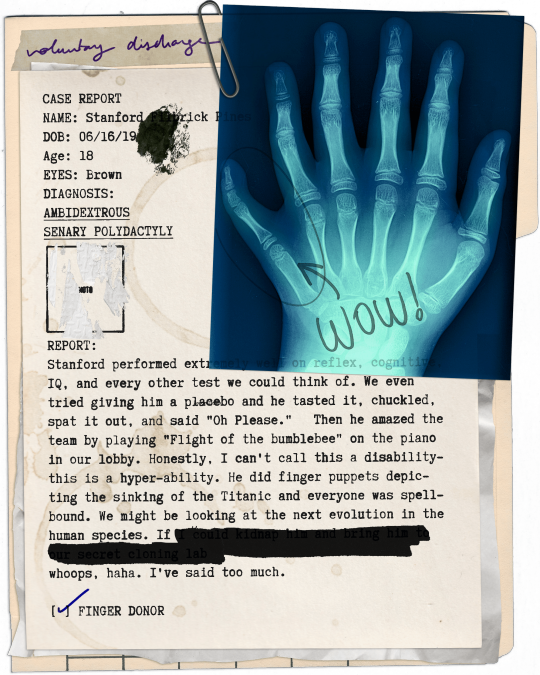
as soon as people started to point this out, everything felt like it made sense to ford. as a person who grew up with autism, i can relate to feeling alienated from my peers, and wondering "why? why, in a world made for normal people, was i made wrong?"
that kind of thought can lead to a sort of delusion.. that maybe you were destined for something great. maybe you were different because one day you would use it to change the world. i believe this is the way ford felt when he was approached by bill
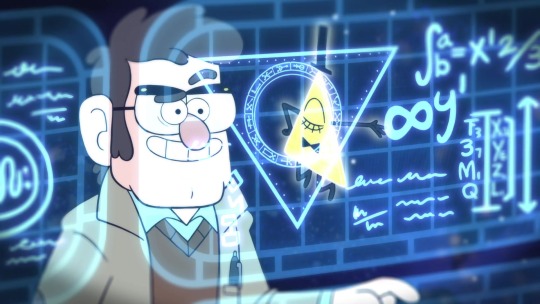
bill came to ford and told him everything he'd ever wanted to hear.. that this feeling was real. that he was destined for greatness. that he was better, smarter, more special than the ones who had shunned him.
bill told ford that building the portal would make him a hero, make people finally see him as more than an extra finger. the one problem?
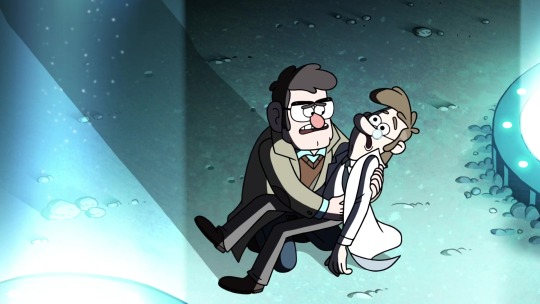
bill was a liar.
he used ford's selfish thoughts to trick him into making a gateway that would end the world. he used the years of mockery, the alienation, the loneliness, and he came to ford when he was alone, trapped, with nowhere to go.
he offered ford the opportunity to get back at a world that was built to knock him down at every turn, a world full of people who would never understand him. he offered to make ford a god.
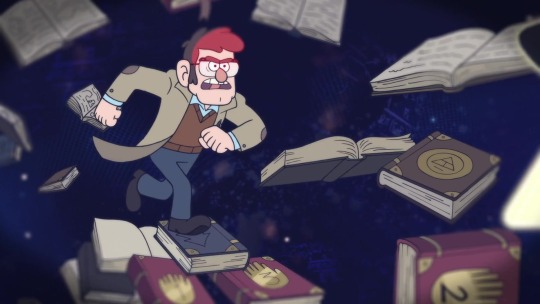
and ford refused
he refused, even in a world that had done nothing but tear him down, to hurt others just to feel better about himself. he only had a few people who had ever cared for him, and yet, he was willing to destroy his life's work to save everyone who had made him miserable.
remember, he fully intended to stay trapped in the portal for all of eternity. that's why he was so frustrated when stanley brought him back. what we saw as a heroic act from stanley, ford saw as stanley refusing the sacrifice he had made to save him. he didn't thank stanley because nobody thanked him. no one thanked him for his hard work or sacrifice or his years of suffering just to protect stanley.
that, of course, led to this scene, which many people saw as stanford's most frustrating moment.
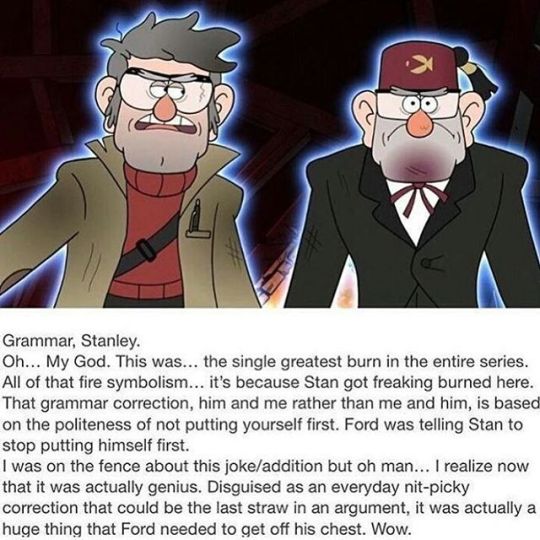
i think this post sums up really well why stanford, in this dire moment, would choose to insult his brother. because stanley was being selfish, too. stanley refused to help save the world, save his brother, all because ford never said "thank you."
they were both selfish. everyone is. they didn't fight because they were bad people, but because they both saw things from their own perspective. they were each hopelessly lonely without each other, but both too prideful to admit it.
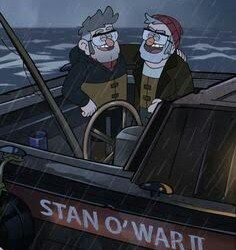
in the end, they make up, and both follow their true dream. not money, not fame, just staying together.
stanford pines is not a bad, unsympathetic character. he is a complex, misdirected, "gifted" child. his only flaw was not seeing that he wasn't alone. his family was right there to support him the whole time.
#stanford pines#stanley pines#gravity falls#the book of bill#book of bill#gravity falls spoilers#undiagnosed autistic old man with 7 phDs#autism#undiagnosed autistic#bill cipher#gifted kid syndrome#rant#thisisnotawebsitedotcom#gravity falls theory#gravity falls thoughts#thanks for reading my old man austism rant#this was just really bugging me#I KNEW I LOVED THAT OLD GEEZER FOR A REASON
256 notes
·
View notes
Text
hey hi. about nimona. yes it's 100% about being trans. but as a nonbinary autistic person? this movie was really touching in ways I didn't even realise were possible.
the entire train scene actually killed me.
"Can you please just be normal for a second? I just think it’d be ... easier if you look human."
"Easier for who?"
"For you. A lot of people aren’t as accepting as me."
then, when Ballister asks what shapeshifting feels like - if it hurts - the way Nimona responds hits very close to home on my experience with stimming.
"Honestly? I feel worse when I don’t do it. Like my insides are itchy. You know that second right before you sneeze? That’s close to it. Then I shapeshift, and I’m free."
And then. "What if you held it in?"
"... I just... sure wouldn’t be living."
not to mention in the original comic, Nimona's parents believe that she's something synonymous to a changeling - that she's something that replaced their "real child". this myth was likely born as an "explanation" for neurodivergent or developmentally disabled children. the townsfolk talk about her getting "better" in the comic. as if there's a cure for the way she is. which is something autistic people deal with all the fucking time.
to end on a more lighthearted note, "I'm not a girl. I'm a shark." was so real of Nimona. I'm so happy they kept that in from the comic, because it was real when I was younger and it's even more real to me now.
this story is a trans allegory loud and proud. I do not want to discredit that with this post. but this story also makes me, an autistic person, feel seen. and that's so fucking important in today's world.
I love this movie to pieces. Please go watch it, and remember to be kind. You will change someone's life for the better.
#not to get serious on main#but it's very important to me#This Movie is very important to me#nimona#nimona movie#autism#autistic
1K notes
·
View notes
Text
Baby's first zine!
I finished drawing my first ever zine! It's by no means professional, but I hope you enjoy.
Under the cut I've placed the pages in order, as well as a short explanation for each one.

The first page is the reason I decided to make this zine. I was braiding my younger cousin's hair, and my father walked in with a video of the hostages being released.

Pages 2 and 3: these are lyrics to a song I learned as a child: Be Proud That You're a Jew, by Avrumi Flam.

Pages 4 and 5: a picture of the kosel, and far more prominently a picture of the Dome of the Rock. It seems to take over every picture of the kosel.

Pages 6 and 7: a quote from Wicked, and a picture of me. I gave myself goat eyes, to parallel Doctor Dillamond — I think the Animals in Wicked make a fantastic Jewish allegory. The horns are not goat horns, but have been added due to the antisemitic myth that jews have horns.

Pages 8 and 9: Elon Musk's nazi salute, and my sister's response. I have never told her that I am autistic, and I likely never will.

Pages 10 and 11: an ad for swastika accessories that popped up on tumblr a while back, and a disappointingly typical tumblr post.

Page 12: three methods of identifying jews throughout history, and one modern. The yellow hat is from 1260s Vienna, the yellow tunic is from the Abbasid caliphate, and the yellow star is from nazi Germany.
74 notes
·
View notes
Text
There's a thought/theory/whatever I've long had about a specific pair of episodes from Star Trek: Deep Space Nine ever since I was a teen, and I'm putting this post out there to see if anybody else had the same thought.
I think Julian Bashir from Deep Space Nine, especially his plotline about having been genetically altered at a young age, is a commentary on neurodivergency.
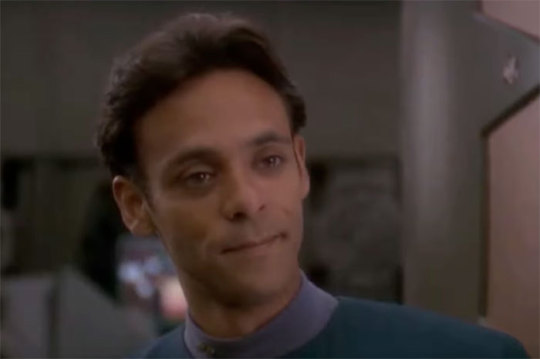
Bashir is characterized as being highly intelligent, albeit lacking in social insight. He excels in academic matters but frequently finds himself floundering around women, being led by the nose by more charismatic people, and not picking up what other people are putting down. This alone would make him the average stereotypical TV depiction of an autistic person, but what I want to focus on is the episode that provides a canonical reason for these traits: the season 5 episode Doctor Bashir, I Presume.
In this episode it's revealed, or retconned really, that Bashir owes his intelligence to genetic tempering. Bashir originally suffered from a learning disability. He was not as intelligent as other children his age, falling far behind his peers, and his parents resorted to illegally altering his genes to "cure" that disability. As a result he instead became exceedingly intelligent. In essence, it took away a symptom that made his life more difficult, and traded it for one that made him more functional.
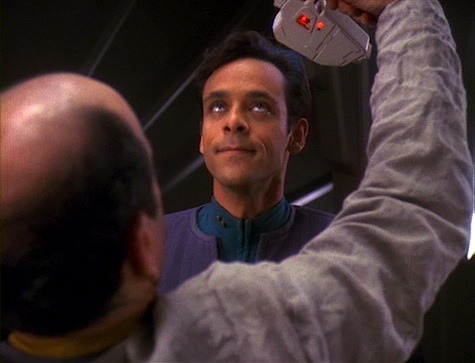
That episode on its own isn't a super strong nod towards autism. Though it does establish that Bashir is at least neurodivergent, it's more a discussion on eugenics and the theoretical ethics of removing disabilities through genetics. What I really want to focus on is the sort-of-sequel to this episode, and the only other episode that really focuses on these themes: the season 6 episode "Statistical Probabilities." In this episode, Bashir sets out to help other people who underwent genetic alteration, but for whom the treatments didn't go as well. The people he meets all display symptoms of one neurodivergency or another. One of them is very hyperactive and lacks empathy, another is very childlike despite being an old man, and another is entirely unresponsive.
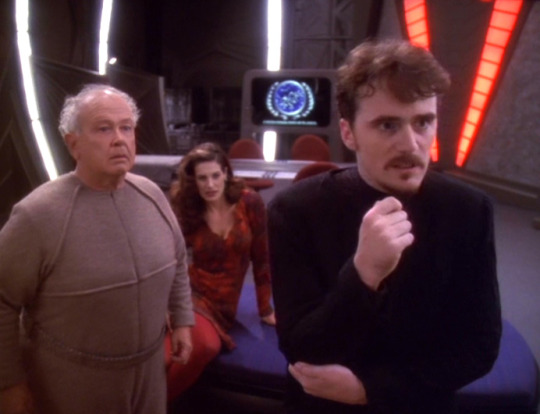
For me, as someone who grew up in special education, I couldn't help but recognize some of the people I knew. To me, the metaphor was clear: "genetic alteration" was really just sci-fi talk for neurodivergency. Julian was the savant, the high-functioning autistic person who successfully integrated into society, because his neurodivergency gave him intelligence and insight that made him useful. And the others weren't as lucky, struggling to lead normal lives because their symptoms impeded their ability to function by themselves.
Bashir spends the episode trying to prove that the other genetically altered people have something to offer society, that there is a place for them. It felt very on the nose to me. But no one I've seen talk about this pair of episodes ever seemed to have taken from them what I took from them. I can't find anyone else online who interpreted the episodes the same way. Maybe my perspective is very particular, as someone who spent so much time in special education growing up, and who has personally struggled with finding a place where I can offer something to others. But idk. Am I seeing allegories that aren't there? What do yall think?
849 notes
·
View notes